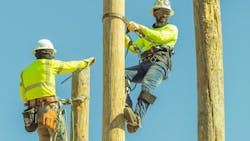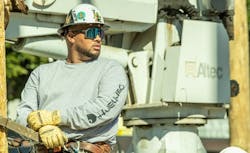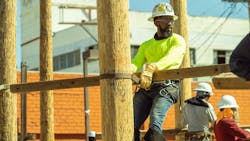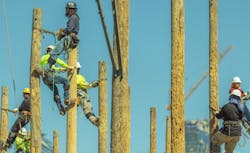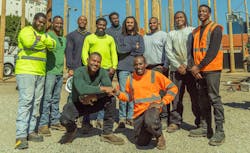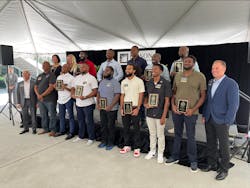Driving Diversity in California Line Work
“Whether or not I actually became a lineworker, I thought this year, through the scholarship, something needed to change, and that I was going to do everything I could do to inform people,” he says. “You want to see people who look like you servicing your area. They know the area, they know the housing, they know what it's like to live out there.”
As he started spreading awareness in the community about the line trade and talking to the students at the local high school, he learned that not many people had heard of the career of a lineman before.
“Everyone who I talked to had been alive since electricity has existed, but no one really knew what a lineworker was,” he says. “If you walk to someone on the street and ask them, ‘What does a lineman do?,’ their first instinct is someone who plays football.”
For the last year, Greer and the other 10 inaugural scholars have trained in the powerline mechanic certificate program at the Los Angeles Trade-Technical College through the Lineworker Scholarship Program, which is funded by Edison International shareholders in partnership with IBEW Local 47, which is providing $50,000 a year. SCE serves one of the country’s most diverse populations, but up until recently, the percentage of black lineworkers was lower than in the population it serves. Zuriel Moreland, a 2021 scholar, says it’s crucial to have workforces who reflect the communities as a whole.
“As the issues of different languages and customs come into play, it can be very helpful,” he says. “I believe that with this program, more people will get access to professions they never knew existed or even believed they could do. It can uplift whole families and change communities for the better over time.”
To take a proactive approach to increasing diversity in the line trade, Edison International launched the four-year, $1 million pilot scholarship program in 2021. Heather Rivard, SCE’s senior vice president of transmission and distribution, says it’s an honor to support the career goals of the scholarship recipients.
“The Edison International Lineworker Scholarship Program is bringing exceptional talent to the linework skilled trade and building a workforce that reflects the communities in which Edison team members live and serve,” Rivard says.
Scholarship recipients not only earn free tuition to LATTC, but through the LA-based nonprofit Brotherhood Crusade, they also receive support services. Once they complete the power line mechanic certificate program, obtain their Class A driver’s license and complete any SCE pre-employment requirements, they are eligible for a groundman entry-level position within SCE’s 50,000-sq-mi service area.
Nicole Taylor, a 2022 Lineworker Scholarship recipient and Los Angeles resident, applied for the scholarship so she would have the opportunity to be part of the energy transition and work outdoors alongside a team.
“Given support to have a chance at this is incredible,” Taylor says. “As a straight woman of color, I believe that getting an opportunity in this male-dominated energy field immensely contributes to the diversity of this workforce. I’m overjoyed to bring my energy to the energy field, especially on the cusp of change for our future and the way energy is used. Change is coming, and I get to be part of it.”
Getting the News
In 2021, Edison International launched the four-year pilot program with an initial focus on potential applicants who self-identify as black or African American, have a high school diploma or GED, are eligible to work in the United States and have a valid driver’s license. Military veterans are encouraged to apply, and preference is given to California residents. The scholarship program is now in its second cohort, and the next application process will begin in spring 2023.
Greer says he learned about the program by reading a post about the SCE Lineworker Scholarship Program on the IBEW Local 11 Facebook page. He thought it sounded too good to be true, but he looked into it and applied for it. Looking back, he remembers the exact moment that he got the call from SCE. He was at home with his wife, and his phone rang with a call from the company.
“The first thing I did was look at my wife and say, ‘We paid the bill, right? I know we paid the bill,” he laughed. “Then (SCE’s) Justin Lee asked me how it was going, and I was waiting for him to ask for credit card information. Then he asked if I had received an email, and he told me I won the scholarship. I about fell on the floor and was jumping up and down.”
His wife had a similar reaction. “She started crying, and I started crying, and it was just knowing what this scholarship was going to mean for our family and mean for the community,” he says. “We were just extremely emotional and so happy, and it’s like you get into a speechless type of thing where you’re like, ‘I can’t believe I won it!”
Taylor says being the first woman to win the Lineworker Scholarship is an enormous collective accomplishment requiring perseverance, overcoming self-doubt and receiving encouragement from people in her immediate support network. “My reaction was pure excitement and shock,” she says. “I happened to be at my desk job and didn’t recognize the number. I answered the call suspiciously, got the news and was ecstatic.”
The scholarship will empower her to have a career, possibly own a home and be financially secure. “I feel like I’ll get to be an unsung hero,” she says. “I get to do something that makes a difference—that matters. I get to be a productive part of society. I’ll no longer be a victim, but a victor.”
At the instant he got the call, Moreland knew his life was going to change for the better “My daughter will have a life in which she will never have to endure some of the tough times and experiences that I and my siblings had when we were growing up,” he says. “That gives me a sense of joy and relief that's hard to explain.”
Through the scholarship, Moreland will be able to go into a fulfilling career with SCE, a great company that has been well established for a long time. “I can now feel some relief in knowing that my family will be secured and not have to want for basic things,” he says. “I know there's a lot of hard work ahead but it's at a company that makes it worth it.”
Moreland will also be a part of the line trade, and he is grateful to be part of a family of workers who care deeply about the people they serve and their co-workers as a whole. “I know I'll be proud of the work I do and can go home with a sense of accomplishment, purpose and pride,” he says.
Michael Smith, another 2021 scholarship recipient, says it felt surreal during a large portion of the scholarship process. “To me, it was like playing the lottery, although the odds are probably a lot better,” he says. “My initial response was excitement, gratitude and slight disbelief. It really felt like a dream.”
In the last year, due to the scholarship program, his quality of life has already improved. “It definitely changed my life for the better,” Smith says. “I don’t think words can express the amount of gratitude and thankfulness I have for Southern California Edison and everybody who is involved in the scholarship.”
Shelton Boykin II, a 2022 scholar, had just received a job offer to return to Japan to play basketball when he discovered he had won the scholarship. He retired from his basketball career to pursue a life in the line trade.
“I think the scholarship will change my life by giving me a skillset that will allow me to make a steady income,” Boykin says. “Also, this is one of the industries that will always be needed. It feels good to be able to do work for the people in my community, and for those who look like me to be able to see me work hard for them and myself.”
Learning About Line Life
For Greer, seeing other people in need following severe storms is what fueled his interest in the line trade. Back in 2005, during Hurricane Katrina, he vividly remembers his godfather worrying about his friends and family back in Louisiana. As Greer watched the news stories about the first responders and lineworkers on the scene, it had a profound effect on him.
Fast forward to years later, and he recalled his grandfather, who was living in Texas, losing power to his home and sleeping in his car with the heater on to stay warm. Once again, the linemen were out in full force.
“The line crews were out there working day in and day out,” Greer says. “They were cold and struggling, but you knew they were out there to help other people. It was for a paycheck, but if you’re not doing this to help people and get something else out of it, then the money is just an added bonus if you think about it.”
Smith says the scholarship introduced him to a field that he was not aware of, and he thinks it will do the same for many others. He says the feeling of one day being able to work as a lineman in his community is almost indescribable. “Knowing that I’ll be able to contribute my fractionally small part to ensuring businesses are still running, hospitals have power and food is kept refrigerated is really quite overwhelming and feels really good,” Smith says.
Vincent Barney, a 2021 scholar, agreed, saying he felt blessed and humbled to be able to one day perform work that has a direct impact on the well-being of others.
“Lights and power are things that most of us take for granted, however, when there’s a power outage and the lights go out for any length of time, we realize just how important it is to keep the lights and power on,” Barney says. “Being even a small part of the reason a medical facility, school or a residential neighborhood has power is something I will always respect and take the utmost pride in.”
Barney has always wanted to pursue a career path with SCE and learning that he won the scholarship made all of his previous sacrifices worthwhile. “Although I was willing to do whatever it took before receiving the scholarship, the path to becoming a lineman can seem long and confusing at times,” he says. “The best thing the scholarship did for me was to cut out a lot of the noise and confusion and provide me with a more direct path to achieve my ultimate career goal of becoming a lineman.”
Training in the Trade
The scholars travel from cities across southern California to train at LATTC. For example, Greer leaves his house at 4:45 a.m. to drive 45 miles from Rancho Cucamonga, California, to downtown Los Angeles. Class doesn’t start until 7 a.m., but he likes to get to arrive early to learn about what he’ll be focusing on that day in the classroom.
After doing a Stretch and Flex in the pole yard, he and the other students go for a two-mile walk/run. Once they get back to the pole orchard, they don their gear, split up into groups and perform tasks like raising and lowering crossarms and learning the procedures to lift transformers. Then around noon or 1 p.m., they head inside to the classroom to watch videos and learn about everything from sizing wire to working with insulators.
To succeed in the program, he says it’s important to be physically fit, but the most important thing in the line trade—and trades in general—is to be willing to learn. “I came from the electrician side and have an electrical background,” he says. “You’re not going to go up to the instructor when he’s trying to teach us how to wire up a transformer, and say you know how to do that. That’s the worst thing you can possibly do.”
Instead, he said it’s better to go in with a blank slate. “I want to soak up all the information and all the knowledge I can get over the four months, he says, because after that, it’s the real world, and I’m applying for jobs,” he says. “If you’re willing to learn and change your ways, then I think you can be a very successful lineworker.”
At the same time, however, Greer’s prior experience in the electrician training program has allowed him to help the 46 other students with their questions about AC theory and principles of electricity. “Having that extra knowledge and being able to share it has been really helpful,” he says.
While Greer had a background in electricity, however, gaining the confidence to climb a pole for the first time was a different story. “The first day that we were out there in the pole yard, and we stepped onto the poles, we got up about 5 ft high, and about 30 of the guys were shaking, including myself. We were just like,’ What did we sign up for?’”
He remembers his feet, ankles and shins hurt, but his instructor stood firm. “He was very adamant, and he just said, ‘Give me three weeks. If you can stay with me for three weeks, I’ll make you guys climbers and make you ready for this trade,” he recalled. “The majority of them stuck it out, but when the three-week mark hit, some of them went up to the instructor and said, ‘This isn’t for me.’”
As Greer soon found out, the line trade is not for everyone. “It’s an extremely challenging career field, and it’s one of the most dangerous careers in the world. When you’re working with guys you’ve never worked with before, you’re trying to get everyone up to speed and make sure everyone goes home safely.”
For Greer, he says he has a natural fear of heights and gets butterflies in his stomach, but he will never forget the first time he ever got to the top of the 35-ft pole. “The pole started to sway a little bit, and as you get higher and to the very top, you’re breathing hard, and you’re looking around, and you see all the other guys are at the top as well,” he says. “All of a sudden, that fear just goes away. You look at your guys and say, ‘We did it!’ Once the instructor sees we are all happy, he tells us to come back down and do it again.”
Supporting the Scholars
The Brotherhood Crusade staff members have visited both the training grounds and classrooms at LATTC on several occasions to visit the scholars and see them in action. “To say that it was inspiring was an understatement,” says Charise Henry, vice president of workforce development at the Brotherhood Crusade.
As part of the scholarship program, the scholars receive personalized support services from the Brotherhood Crusade. The organization, which was founded 50 years ago, provides human and social services to more than 100,000 South Los Angeles residents annually. Its mission is to improve quality of life and address the unmet needs of underserved, underrepresented and disenfranchised South Los Angeles residents through fiscal, in-kind and volunteer resources from within the community.
SCE, which has been a long-time sponsor and supporter of Brotherhood Crusade, invited the organization to partner on the scholarship program based on its dedication to supporting the community, Henry says.
“To play a role in the growth and development of the scholars as they become linemen is exciting,” Henry says. “This work not only impacts the individuals and their families, but also their respective communities in which they live and work. It also, ultimately, increase the diversity in talent that SCE strives to achieve.”
During the training program, the scholars have access to a comprehensive case management team and a plethora of resources. The workforce development models address the barriers that impede one’s ability to access middle-wage employment—from gaps in skill sets to housing assistance to a need for mental health assistance.
“We use an individualized, human-centered approach to service delivery,” she says. “Each scholar has his or her individual needs assessed and addressed.”
For example, the Brotherhood Crusade assisted with housing and utility payments and the purchase of essential needs. In addition, scholars were provided with mentorship, financial literacy training and linkages to social service assistance. By providing support for the scholarship recipients’ basic needs during the training program, Edison International lessened the barriers and helped them to achieve success.
“Oftentimes, the greatest obstacle that many of our students face is having to divide their time between their educational pursuits and working a job to cover their financial obligations,” Henry says. “They were able to dedicate their attention to the requisite time without having to worry about their housing expenses or the rising costs gas or food. This type of investment, on the part of SCE, into the scholars is monumental and life changing.”
Greer says he and the other scholarship recipients appreciate the support from the Brotherhood Crusade. For example, just earning a Class A driver’s license can be extremely expensive. “A majority of driving schools are charging upwards of $4,000 to $4,500, and I don’t know a lot of people who have $4,500 laying around,” Greer says. “Just being able to get my Class A driver’s license and learning a trade that I’ll be able to pass down to my kids—it’s incredible.”
Through the program, the case managers from the Brotherhood Crusade have reached out to Greer and the other scholarship recipients to identify their needs ranging from rent, mortgages and paying for gas or cell phone bills to childcare. “They understood that the class that we’re taking is pretty much like a full-time job because it’s Monday through Friday from 7 a.m. to 2 p.m.,” he says. “It helps us to stay afloat and make sure we don’t have those other financial worries when we’re trying to complete this class, so it’s been really helpful.”
For example, Greer says a few of the scholarship recipients got their car fixed with help from the Brotherhood Crusade.“Our instructor is a real stickler for tardiness and attendance, and he wants us to treat it like a job, which we all respect,” he says. “When your car breaks down, and you’re traveling 40 to 50 miles-plus to get to school, you’re thinking that this was your chance, and you blew it because you can’t make it to class.”
Through the support services, however, the scholarship recipients were able to get their cars fixed over the weekend so they could make it to school on time. “Some of these guys were saying it would have cost $4,000 to $5,000 to fix it that fast, so supportive services have been great,” he says.
Increasing Diversity
Through the scholarship program and the support from the Brotherhood Crusade, the scholars are on the path to a career in the line trade.
“It can provide opportunities to underrepresented communities and to those who may not otherwise be aware of the prosperity that a career in the trades can potentially provide,” Barney says.
The Edison International Lineworker Scholarship Program is raising awareness, Greer says, and he hopes it will inspire other utilities nationwide to invest in the diversity of their field workforce. Just in the first year of the program, other utilities are already asking questions about the program and looking to launch a similar initiative. “When you have a company that is the size of Edison and the area that they cover, and they’re one of the first ones to do this, it’s going to get people talking,” Greer says. “Once individuals start to take notice that the line trade is getting more diverse, I feel like the other trades will begin to follow.”
As the father of a newborn and an almost two-year-old son, Greer is proud to be part of the program and his company’s initiative to increase diversity in the line trade. One day when he tops out as a journeyman lineman, he is looking forward to inspiring the next generation. “Little kids are going to look up and see me up there (on the pole),” he says. “They’ll be like, ‘I didn’t know I can do that. How can I go about doing that?”
In the past year, he says the scholarship has already changed his life forever. For example, it has allowed him to obtain his CDL Class A license and a Powerline Mechanic Certificate, which includes a pole climbing certificate. “For most of my adult life, I’ve been searching for a career that would fulfill my need to help others,” he says. “I now know I’ve found my calling, and my hope is to pass along the passion that I found for linework to my boys.”
Serving his community as a member of a line crew means so much to him and his family, he says. His career in the line trade will not only provide financial stability, but it will give him the opportunity to help the community.
“For 10 years, I have respected and admired line crews from afar, just seeing how they put their lives on the line day in and day out so that people can have electricity,” he says. “You don’t get into this career without having a passion for helping people, serving your community or a love of the outdoors. I can’t wait to get out to the field and serve the community by keeping the lights on.”
Editor’s Note: Listen to an interview with Djon Greer, 2021 SCE Lineworker Scholarship recipient, in the August 2022 Line Life podcast. Also, to learn more about the SCE Lineworker Scholarship Program, visit www.edison.com/home/community/lineworker-scholarship.
Amy Fischbach ([email protected]) is the field editor for T&D World magazine.
About the Author
Amy Fischbach
Electric Utilities Operations
Amy Fischbach is the Field Editor for T&D World magazine and manages the Electric Utility Operations section. She is the host of the Line Life Podcast, which celebrates the grit, courage and inspirational teamwork of the line trade. She also works on the annual Lineworker Supplement and the Vegetation Management Supplement as well as the Lineman Life and Lineman's Rodeo News enewsletters. Amy also covers events such as the Trees & Utilities conference and the International Lineman's Rodeo. She is the past president of the ASBPE Educational Foundation and ASBPE and earned her bachelor's and master's degrees in journalism from Kansas State University. She can be reached at [email protected].
